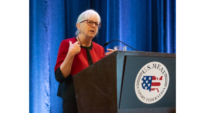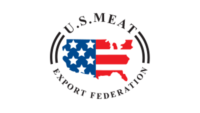The U.S. Meat Export Federation Strategic Planning Conference wrapped up Nov. 10 in New Orleans with the election of a new officer team. Randy Spronk, a pork and grain producer from Edgerton, Minn., is the new USMEF chair.
A past president of National Pork Producers Council and Minnesota Pork Producers Association, Spronk is president and managing partner for Spronk Brothers Holding, which includes operations that produce feedgrains and pork along with feed milling and delivery. Spronk is also part of a group of producers that purchased a former Hormel plant and is marketing pork products under the label of Wholestone Foods.
“It's phenomenal to see how different organizations work together through USMEF to export U.S. beef, pork and lamb worldwide,” Spronk said. “We bring all the sectors together into one room and discuss trade. What are the obstacles? What are the things we've done right?”
Spronk has participated in numerous trade missions, beginning with a 1999 journey to Japan with then-Minnesota Governor Jesse Ventura. Spronk made his first return to Japan this year as part of a USMEF delegation that also visited South Korea. He has also promoted U.S. red-meat products in several Latin American markets while on trade missions and during USMEF product showcases in Colombia, Panama and the Dominican Republic. These experiences have driven home the importance of market diversification, ensuring that the U.S. meat industry is not overly dependent on a few major destinations.
Diversification, which Spronk said is the key to maximizing export value, is one of the “Three Ds” he emphasized in his address to USMEF members: Diversification of export markets and differentiation of high-quality U.S. meat, to expand global demand.
“Having multiple markets will bring more value back to our producers,” Spronk said. “We also have to differentiate what we do in the United States from others so that we have long-term growth in our markets. I think we have a strong story to tell on sustainability and it can help differentiate us, because of how responsibly we produce our feed and livestock. It’s a story that nobody else in the world can replicate.”
Spronk succeeds outgoing USMEF Chair Dean Meyer, a corn, soybean and livestock producer from Rock Rapids, Iowa. Steve Hanson, a cattle rancher from Southwestern Nebraska who is also president of the Nebraska Cattlemen, will serve as USMEF chair-elect in the coming year. The vice chair is Jay Theiler, executive vice president of corporate affairs for Agri Beef, based in Boise, Idaho.
The newest USMEF officer is Secretary/Treasurer David Bruntz, a farmer and cattle feeder from Friend, Neb. Bruntz farms with his brother and nephew, raising corn and soybeans along with fed cattle. His past leadership roles include serving as chair of the Nebraska Corn Board, president of the Nebraska Cattlemen and regional vice president of the National Cattlemen’s Beef Association. Bruntz has also served on the USMEF Executive Committee, representing the feedgrains sector.
The Nov. 10 closing business session also included an update on transportation and logistics issues that impact U.S. pork, beef and lamb exports. Mark Szakonyi, executive editor for the Journal of Commerce, reviewed the Federal Maritime Commission’s progress in implementing the Ocean Shipping Reform Act. The legislation passed in mid-2022, but the FMC is still working through key rulemakings mandated by Congress on detention and demurrage billing practices and the circumstances in which ocean carriers may refuse cargo. Szakonyi also previewed upcoming negotiations on a new labor contract for East and Gulf Coast longshoremen.
Greg Shimonek, director of key accounts for Americold Logistics, informed USMEF members about the growing number of options for moving meat and other refrigerated food products by rail. To date, these services have been limited to transport within the U.S. market and to coastal ports for export, but Americold is working with Canadian Pacific Kansas City Railroad and regulatory officials to accommodate direct transport to destinations in Mexico. This type of service is of increasing interest to exporters due to heightening congestion at some U.S.-Mexico border crossings.
Activities for Nov. 9 included meetings of USMEF’s standing committees, where USMEF international staff and other speakers updated attendees on issues of particular interest to the pork, beef, exporter and feedgrain and oilseed sectors. USMEF members also toured the Port of New Orleans and nearby cold storage facilities operated by Lineage Logistics.
Also on Nov. 9, USMEF presented its Michael J. Mansfield Award to former ambassador to China and longtime Iowa governor Terry Branstad. Bill Westman, who had a long career with the USDA Foreign Agricultural Service and later directed international affairs for the North American Meat Institute, received the USMEF Distinguished Service Award. More details on these awards are available from the USMEF website.
Highlights from opening day of the USMEF Strategic Planning Conference are detailed in this news release.
USMEF members will next meet May 22–24 at the federation’s Spring Conference in Kansas City.
Source: U.S. Meat Export Federation




Report Abusive Comment